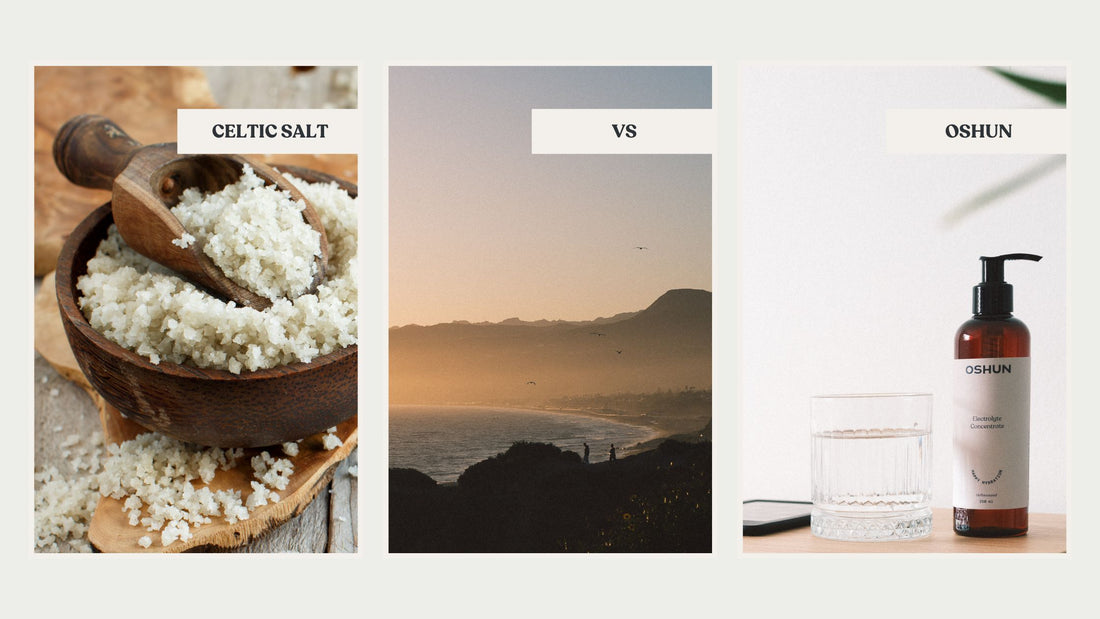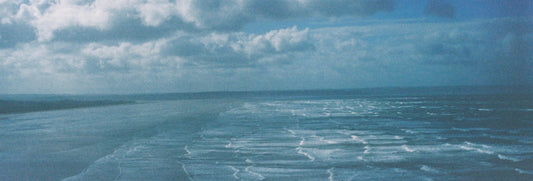
Celtic Sea Salt vs Oshun Electrolyte Concentrate
Share
Celtic Sea Salt, originally known as Sel Gris de Guérande in France, is a fantastic alternative to table salt. Indeed, whereas most table salts contain 98% sodium chloride and not much else, Celtic Salt contains a much lower 70-80% sodium chloride and many more trace minerals. For this reason, it’s easy to understand why Celtic Sea Salt has become a viral sensation. In fact, it contains many of the minerals found in Oshun’s electrolyte concentrate that we know to be beneficial for mental energy, plump and hydrated skin, and many other benefits.
So how does the TikTok viral product compare to Oshun?
This is a question we’re often asked. Below, we break down the key differences between Celtic Sea Salt grains, also known as Grey Salt (or Sel Gris where it originates from in France) and Oshun’s liquid electrolyte concentrate sourced from the Great Salt Lake of Utah.
The first thing you need to know about Celtic Sea Salt, or any unrefined sea salts, is that it is not consistent. It is a snapshot of what’s in the sea water at one particular moment in time. Unlike Oshun, there are no measures in place to ensure a consistent nutritional profile. This is why you may have a hard time researching the nutritional information of Celtic Sea Salt: it is rarely shared, because it is not always known.
Celtic Salt is not a standardised food supplement
When taking Celtic Sea Salt as a health supplement, you need to be comfortable with guess work. In fact Celtic Sea Salt is classed as a food product rather than a food supplement, which is why it is not required to provide mineral breakdowns on its label. Add to this the fact that it's quite difficult to measure out a standardised dose of salt crystals, and the result will be rather inconsistent.
At Oshun, we took some time to research average contents of this famous “Sel Gris”. While it’s claimed to contain 82 trace minerals, and has clear nutritional benefits over refined table salt (i.e. pure sodium chloride), Celtic Salt is primarily composed of sodium at around 70-80% sodium chloride.
Sodium is a key electrolyte, but it’s also the most abundant in our diet and the cheapest to source – refined table salt is a very cost-effective source of sodium. When it comes to other key electrolytes such as Magnesium and Potassium, which provide many of the skin and mind benefits of Oshun, it gets a little tricker to find nutritional values from Celtic Salt. This is where the benefits of Celtic Sea Salt may have become slightly inflated though its virality.
Nutritional guesswork
It's important to remember that when talking about Celtic Sea Salt, we can only estimate based on averages, whereas Oshun is levelled out with Purified Water and Potassium Chloride to ensure a consistent nutritional profile. Having said that, let’s consider Celtic Salt’s average of 0.5% magnesium and 0.15% potassium concentration.
Let’s look at how that translates in terms of an average serving size vs Oshun’s daily serving of 4 pumps (we recommend 4-8 pumps per day depending on your lifestyle).

What does this mean in terms of the impact of Celtic Sea salt on your daily nutritional intake?
While the presence of minerals such as Potassium and Magnesium in trace amounts makes Celtic Sea Salt more nutritious than a conventional table salt, it should still be considered primarily a sodium product, and not a multi-mineral supplement such as Oshun.
At a like for like amount of sodium chloride (320mg vs 250mg), 4 pumps of Oshun deliver 20 times the amount of Potassium in a gram of Celtic Sea Salt. When it comes to Magnesium, Oshun provides an equally whopping 18 times more than Celtic Salt.
To obtain a meaningful 15% of your daily Magnesium nutrient value, you’d need to ingest 15 grams of Celtic Sea Salt per day – something we would not recommend, since it would put your sodium levels at a sky high 5 grams per day: over twice the upper recommended level of 2.3 grams. And that’s before you’ve eaten anything.
Mould considerations
While salt is a self-preserving food stable, Celtic Sea Salt has the peculiarity of remaining “wet”. It is not entirely dried and maintains approximately 10% humidity. This creates a humid product which is often exposed to air over long periods of time – in an open package in your kitchen cupboard for example. We would urge you to exercise caution here, as sea salts are known to be a potential source of fungi which can cause food spoilage.
Summary: Celtic Sea Salt vs Oshun Electrolyte Concentrate
Celtic Sea Salt is a fantastic choice as food seasoning. When carefully stored to avoid mould proliferation, it is nutritionally superior to high-sodium table salt.
However, Celtic Salt is not a good choice when it comes to supplementing your diet with a variety of minerals and electrolytes in meaningful levels. For this, we recommend Oshun’s Electrolyte Concentrate.



